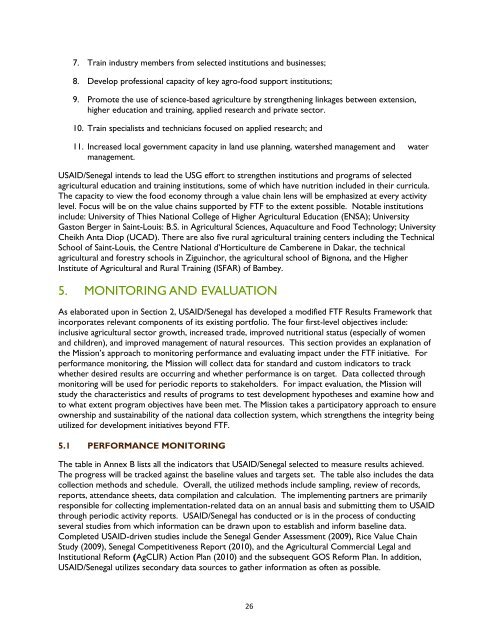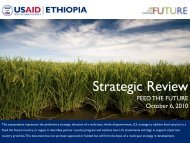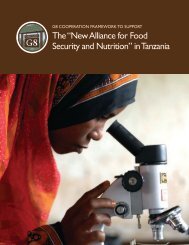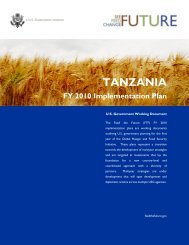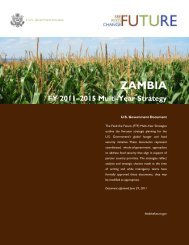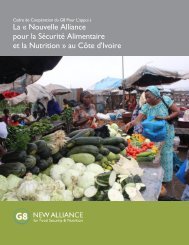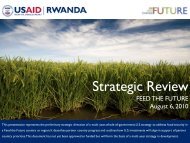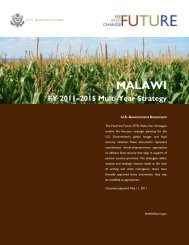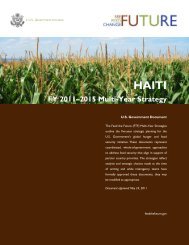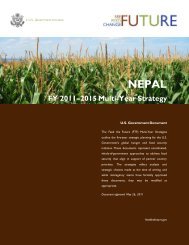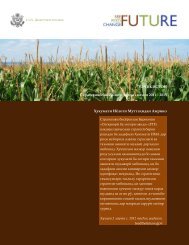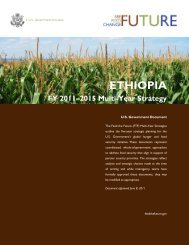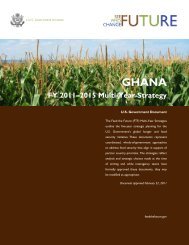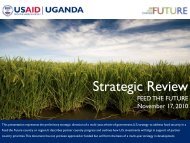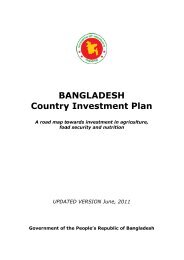Feed the Future Multi-Year Strategy, Senegal, Public
Feed the Future Multi-Year Strategy, Senegal, Public
Feed the Future Multi-Year Strategy, Senegal, Public
You also want an ePaper? Increase the reach of your titles
YUMPU automatically turns print PDFs into web optimized ePapers that Google loves.
7. Train industry members from selected institutions and businesses;<br />
8. Develop professional capacity of key agro-food support institutions;<br />
9. Promote <strong>the</strong> use of science-based agriculture by streng<strong>the</strong>ning linkages between extension,<br />
higher education and training, applied research and private sector.<br />
10. Train specialists and technicians focused on applied research; and<br />
11. Increased local government capacity in land use planning, watershed management and water<br />
management.<br />
USAID/<strong>Senegal</strong> intends to lead <strong>the</strong> USG effort to streng<strong>the</strong>n institutions and programs of selected<br />
agricultural education and training institutions, some of which have nutrition included in <strong>the</strong>ir curricula.<br />
The capacity to view <strong>the</strong> food economy through a value chain lens will be emphasized at every activity<br />
level. Focus will be on <strong>the</strong> value chains supported by FTF to <strong>the</strong> extent possible. Notable institutions<br />
include: University of Thies National College of Higher Agricultural Education (ENSA); University<br />
Gaston Berger in Saint-Louis: B.S. in Agricultural Sciences, Aquaculture and Food Technology; University<br />
Cheikh Anta Diop (UCAD). There are also five rural agricultural training centers including <strong>the</strong> Technical<br />
School of Saint-Louis, <strong>the</strong> Centre National d’Horticulture de Camberene in Dakar, <strong>the</strong> technical<br />
agricultural and forestry schools in Ziguinchor, <strong>the</strong> agricultural school of Bignona, and <strong>the</strong> Higher<br />
Institute of Agricultural and Rural Training (ISFAR) of Bambey.<br />
5. MONITORING AND EVALUATION<br />
As elaborated upon in Section 2, USAID/<strong>Senegal</strong> has developed a modified FTF Results Framework that<br />
incorporates relevant components of its existing portfolio. The four first-level objectives include:<br />
inclusive agricultural sector growth, increased trade, improved nutritional status (especially of women<br />
and children), and improved management of natural resources. This section provides an explanation of<br />
<strong>the</strong> Mission’s approach to monitoring performance and evaluating impact under <strong>the</strong> FTF initiative. For<br />
performance monitoring, <strong>the</strong> Mission will collect data for standard and custom indicators to track<br />
whe<strong>the</strong>r desired results are occurring and whe<strong>the</strong>r performance is on target. Data collected through<br />
monitoring will be used for periodic reports to stakeholders. For impact evaluation, <strong>the</strong> Mission will<br />
study <strong>the</strong> characteristics and results of programs to test development hypo<strong>the</strong>ses and examine how and<br />
to what extent program objectives have been met. The Mission takes a participatory approach to ensure<br />
ownership and sustainability of <strong>the</strong> national data collection system, which streng<strong>the</strong>ns <strong>the</strong> integrity being<br />
utilized for development initiatives beyond FTF.<br />
5.1 PERFORMANCE MONITORING<br />
The table in Annex B lists all <strong>the</strong> indicators that USAID/<strong>Senegal</strong> selected to measure results achieved.<br />
The progress will be tracked against <strong>the</strong> baseline values and targets set. The table also includes <strong>the</strong> data<br />
collection methods and schedule. Overall, <strong>the</strong> utilized methods include sampling, review of records,<br />
reports, attendance sheets, data compilation and calculation. The implementing partners are primarily<br />
responsible for collecting implementation-related data on an annual basis and submitting <strong>the</strong>m to USAID<br />
through periodic activity reports. USAID/<strong>Senegal</strong> has conducted or is in <strong>the</strong> process of conducting<br />
several studies from which information can be drawn upon to establish and inform baseline data.<br />
Completed USAID-driven studies include <strong>the</strong> <strong>Senegal</strong> Gender Assessment (2009), Rice Value Chain<br />
Study (2009), <strong>Senegal</strong> Competitiveness Report (2010), and <strong>the</strong> Agricultural Commercial Legal and<br />
Institutional Reform (AgCLIR) Action Plan (2010) and <strong>the</strong> subsequent GOS Reform Plan. In addition,<br />
USAID/<strong>Senegal</strong> utilizes secondary data sources to ga<strong>the</strong>r information as often as possible.<br />
26


